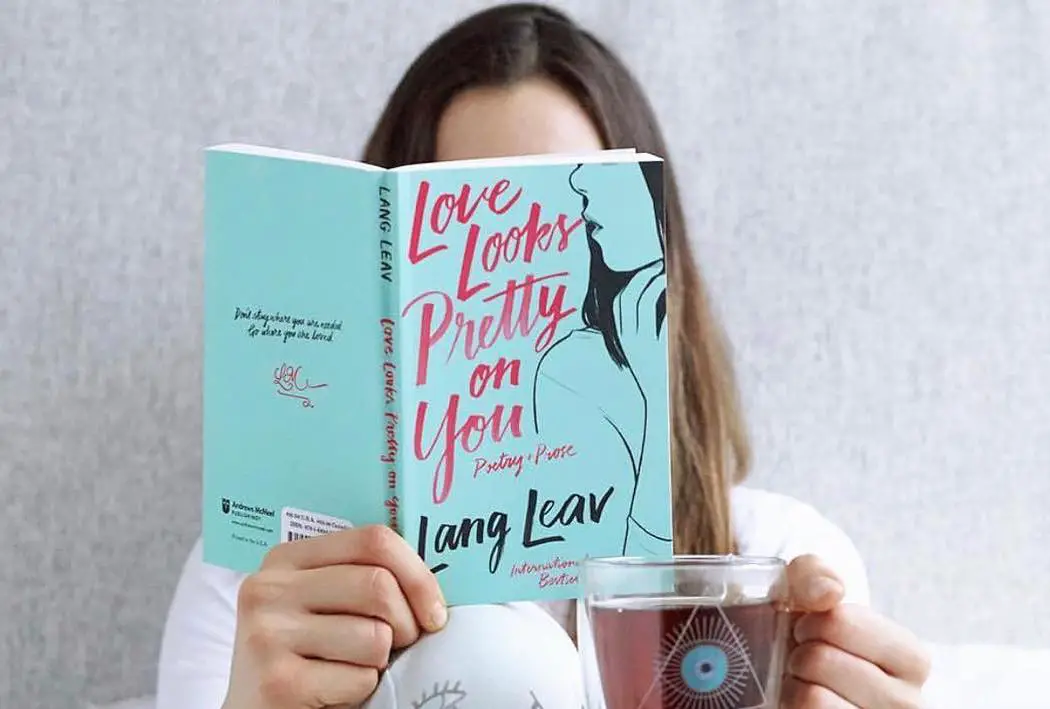Most aspiring writers coincidentally have the same first love in common: A passion for words and books. Lang Leav, one of the leaders credited with the uprising of popular contemporary poetry, encountered this passion early on. At a young age, she recalls feeling proud after writing her name for the first time and rushing to show her parents her profound accomplishment.
As Leav repeated the process incessantly, her obsession with writing slowly began to evolve throughout the different stages of her life. In “Love Looks Pretty on You,” her most recent release, the artist even provides a poem she wrote at the juvenile age of 12 to portray her development over time.
Leav has certainly come a long way since she first started posting her poems on Tumblr in 2012. With nearly two million followers across social media today, the recipient of several literary achievements has become a key contributor in the transformation of the modern poetry genre. Nowadays, the name Lang Leav can be found inside the majority of bookstores across the globe, her work located near timeless poets such as Emily Dickinson and Robert Frost.
Despite the constant flow of criticism she receives for producing overly-simplistic work, Leav has almost single-handedly revived a dying genre. When she was beginning her journey and attempting to curate a name for herself, publishing companies were very hesitant to invest in poetry, but it has grown tremendously popular since then, with up and coming poets receiving recognition both online and in-print on a regular basis.
Although she feels as though the classification “Instagram poet” is a ridiculous term, Leav understands the power of using social media to promote a personal brand and message in this day and age. She compares this new-wave of sharing artwork to the Beat movement of the 1950s, when poets such as Allen Ginsberg and Jack Kerouac tapped into the momentum of their generation to creatively express themselves. Similar to the Beat poets, Leav enchants audiences with her vocalization of several intimate topics from several different, relatable vantage points.
At the end of January, the best-selling novelist and poet published her seventh book to date. “Love Looks Pretty on You” tackles a myriad of themes relating to the struggles commonly faced by humankind, including but not limited to love, heartbreak, healing and self-empowerment.
On the surface, her words may seem childlike and conversational. However, as we explore the stories she tells between the lines, Leav’s lyrical confessions can be seen as a façade tangled up in far more intricate emotions. As we analyze some of the poems from her latest collection, Leav’s ability to maintain gracefulness while exposing her soul to readers becomes intoxicating.
Love: “At Last“
“Love looks pretty on you. Makes you soft, tender, proud.
Makes you sit up and take notice. Gives you a home to set down your things.
What a blessing it is, to have music and dancing and poetry.
What a gift it is to look at someone and say,
I’m so happy to have found you—at last, at last, at long, long last—you’re here.”
Love, the most common premise of Leav’s work and of art as a whole, has found a niche yet again in “Love Looks Pretty on You.” Leav reminds us of those fleeting moments when you can confidently say you’ve found love — looking into the eyes of a lover, being young and envisioning a whole life together, or simply playing a song on repeat because you’ve fallen in love with a rhythm that fills you with complete and utter joy.
These emotions, while inimitable to each individual, define the sweet feeling of adoration that makes a person grateful to be alive.
Heartbreak: “Trapped”
“I believed he loved me in his way,
the scars I needn’t show—
there was nowhere else to go.
I said I was happy to be his girl,
if only I had known—
my words were not my own.”
“Love Looks Pretty on You” includes a magnitude of references to abuse in relationships, specifically the fear that is imbedded in women when they become accustomed to maltreatment from their significant others.
While poems like the one above can be tough to read at times, they offer a condolence to survivors that feel like a tight hug from a friend as they comfort you. Leav’s anger and sorrow are palpable as she finds the words to offer justice for the injustice that is so painfully hard to describe.
Healing and Self-Empowerment: “The Present”
“You are here. Safe in the knowledge you are unequivocally happy. That you always were, even when you had nothing. Your soul sings with gratitude for the peace you have found. The love you have found. For the quiet that allows you to do your work and still find time.
Time to watch the flowers grow, time to watch the children grow. Time for everything that is still to come.”
Leav practices mindfulness through her writing and suggests that readers do the same thing in the ways they deem appropriate. The most important step that she discusses on a recurring basis is the ability to accept past mistakes as a valuable lesson, and to let go of any harrowing regret.
She believes that people can only ever become genuinely happy if they’ve worked through errors in judgment and thoughtfully moved forward in a more positive direction. In order for us humans to become the best versions of ourselves, we must heal the broken parts of our soul, and with that said, the importance of empowering the resilient aspects of our beings becomes increasingly more impactful.
For existing fans of Leav’s work, this series of delicate poetry and prose will be a welcome addition to your ever-growing collection. And if you are someone who wishes to explore the world of contemporary poetry, “Love Looks Pretty on You” is a captivating and sentimental place to start. I highly recommend this book to anyone who is a lover of words, specifically ones that enlighten your mind and ease your soul.
















